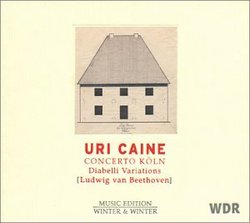More Subtle than Caine's Past Efforts
05/02/2003
(5 out of 5 stars)
"I heartedly disagree with the previous reviewer. Yes, the Diabelli Variations are an arduous task for any performer, but Caine's subtle infusions may go unnoticed by many listeners. Following the album from commencement to conclusion, works by Fats Waller, Bud Powell, Dave Brubeck, and Miles Davis arise; typically woven into Beethoven's lines. If you read the history of the Diabelli Variations, and realize Caine has always arranged with historical reflection in mind(see his klezmer arrangements of Mahler or his deflation of Wagner), this album has a myriad of conceivably astute qualities. Based on studies, one of the most bewildering aspects of the Diabelli Variations is that Beethoven felt the work had a dialetic quality which by the final variation offered the all important moment of self-reference.
Therefore Caine desires to reach a similar zenith. Hence, at times the album may sound stilted or overtly accentuated in the classical structure, but Caine does so with a purpose: to better reflect his personal exegesis of the music and how they affected his relevant considerations. The contrast by Variation 17 becomes startling, and merely continues throughout the release until the final variation. Caine hopes to reach Beethoven's acme.
His past, as a classically trained pianist and then later schooled in jazz(Caine tells stories of his piano teacher having him write jazz sonatinas of Bach at the age of 14), arises and this notion of self-reference becomes the end game.
Whether or not he succeeds remains open for debate.
Nevertheless a release which can foment such discourse deserves more than a mere two star rating, being far less disposable than the previous reviewer implied. Maybe not essential, but fairly enlightening."


 Track Listings (34) - Disc #1
Track Listings (34) - Disc #1